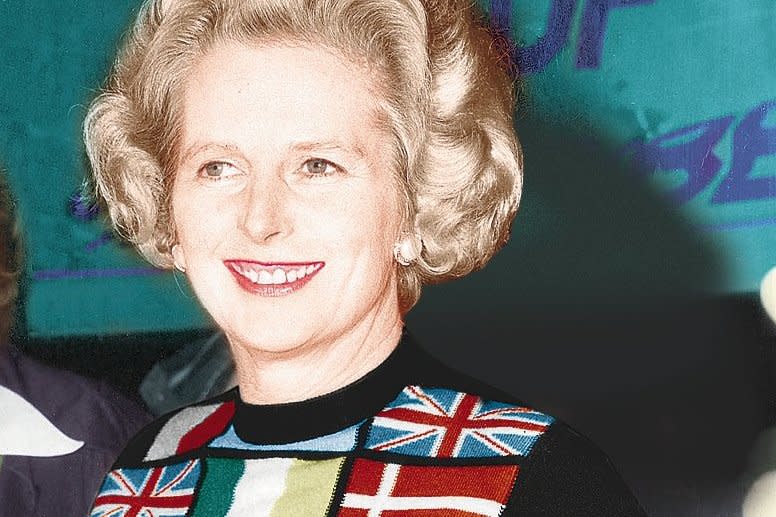This is no time to go wobbly, but it’s Theresa May in charge of Brexit, not Maggie
One last chance: how often have we heard Theresa May utter these words, or a version of them, as she has introduced yet another iteration of her Brexit deal?
Yet, in the Prime Minister’s speech yesterday, unveiling a 10-point plan to underpin the forthcoming Withdrawal Agreement Bill, there was indeed a new and rueful tone. What she really meant was: this is my last chance.
In this respect, the PM is surely correct. Already committed to resigning before “the second phase of the Brexit negotiations”, she now faces fresh enthusiasm among her own backbenchers for a rule change that would enable them to oust her as soon as possible. On June 15, a special emergency meeting of Conservative activists will consider a vote of no confidence in the party leader. Her plan for a smooth personal exit may soon be abruptly truncated.
So this speech may prove to be her last significant message to the political planet. Though she presented it as a grand compromise — a draft peace treaty between the warring Brexit factions — it was really no such thing. Instead, her final answer to the conundrum of the UK’s departure from the European Union was essentially to restate the question at greater length and with a little more candour.
As three years of negotiation and deliberation have proved beyond doubt, there is no magical arrangement that combines full legal independence from Brussels with all the commercial advantages of the EU single market and customs union.

May’s 10-point plan essentially repackages her thrice-rejected withdrawal agreement with bolt-on extras that have already been rejected by MPs in “indicative votes”. The Commons is now offered the chance to back a second referendum (which it rejected in April by 293 votes to 280) and a customs union (which it voted down by 276 to 273). The question that she has again posed to MPs is not unreasonable: what do you actually want?
Part of the problem is that May herself has been so indecisive about what, precisely, she has in mind. As Chris Cook has shown in a remarkable in-depth study of the Brexit shambles for the new Tortoise media platform, the PM has been plagued by private indecision over the UK’s future relationship with the customs union. After her speeches to the 2016 Conservative conference, Sir Ivan Rogers — then the UK’s permanent representative in Brussels — said to the PM: “You’ve made a decision. This gives me clarity. I can work with this. We’re leaving the customs union.” May, it transpires, was horrified: “I have agreed to no such thing.”
Since then, the Brexit process has become a grotesque hybrid of ideology and confusion. Pro-Leave Tory MPs have veered between outright contempt for May’s concessions to the EU and a (justified) fear that their continued obstruction might have the unintended consequence of thwarting Brexit altogether. To date, they have agreed only to one proposal: the so-called “Brady Amendment” calling for the Irish border backstop to be replaced by unspecified “alternative arrangements”.
Labour, meanwhile, has delivered a masterclass in self-righteous vacillation, claiming a morally superior status as the only party that represents both Remain and Leave voters. In practice, its fence-sitting has pleased neither group and — inevitably — robbed Jeremy Corbyn of much of the campaigning panache that served him so well in the 2017 general election. Even now, it is risibly unclear what his party’s position on Brexit really is. Sometimes he describes a public vote as no more than an “option”; on others, he presents it as a clear commitment.
The task remains the same: avert a constitutional crisis, preserve prosperity and keep the peace in Ireland
If there is any consistency to be excavated from this muddled thinking, it is that Labour would back a referendum to prevent a “bad Tory deal” or a “no-deal” exit; but that it would not back a Tory deal in order to get a referendum. Collectively, Labour is firmly pro-Remain. But Corbyn’s personal dream still appears to be a Brexit wholly owned by the Tories.
Tomorrow’s European elections will probably be a disappointment for Labour — currently trailing both the Lib Dems and Nigel Farage’s Brexit Party in London, according to YouGov. But the Conservatives are bracing themselves for outright humiliation at Farage’s hands when the results are announced on Sunday night.
It is against this lurid electoral backdrop that May’s reheated deal will be considered, almost certainly in the first week of June. It will be widely claimed that the elections were a second referendum in all but name and that Farage’s performance is an instruction to deliver a hard Brexit.
Of course, it will be no such thing. These elections were never meant to happen, the Remain parties have conspicuously failed to form an electoral alliance, and the level of public debate has been pitiful — reduced to an argument about the propriety of throwing milkshakes on candidates.
Whatever the results, the task facing ministers and MPs alike on Monday morning will be unchanged: to rescue the nation from a constitutional crisis, preserve public prosperity and keep the peace in Ireland.
To this extent, the PM is right: if her deal fails (which it will), there will be a three-way choice between a general election, a fresh referendum and a no-deal exit on October 31. The range of options is narrowing with pitiless speed, and those who represent us face formidable decisions that can no longer be postponed or evaded. As the Iron Lady said: this is no time to go wobbly.

 Yahoo News
Yahoo News 


